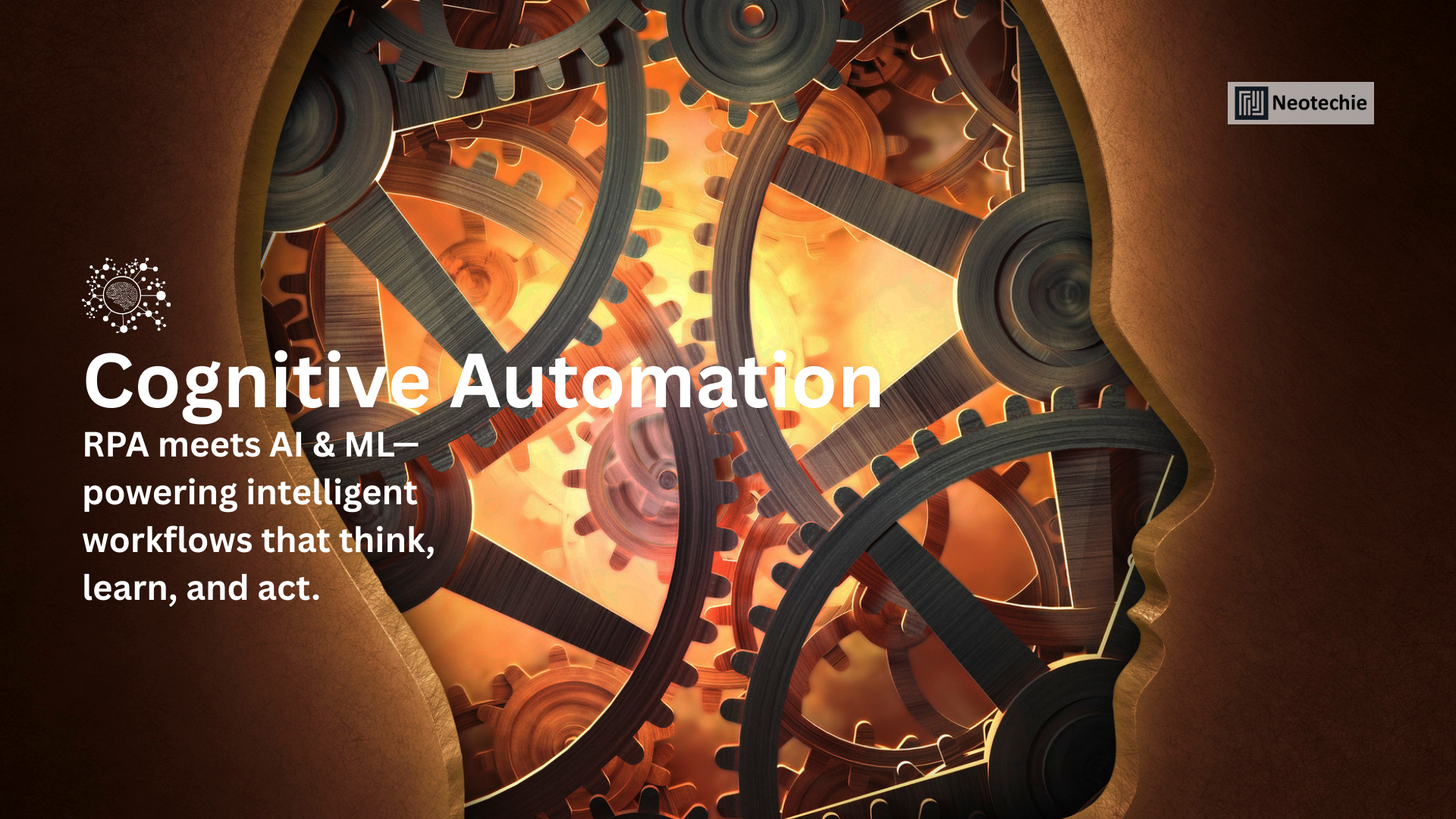Cognitive Automation: Combining RPA with AI & ML to Drive Intelligent Workflows
Introduction
As businesses push toward greater efficiency and resilience, automation has become a central pillar of transformation. While Robotic Process Automation (RPA) has been successful in eliminating repetitive manual tasks, it often struggles with unstructured data, decision-making, and adaptive learning. This is where Cognitive Automation—the fusion of RPA with Artificial Intelligence (AI) and Machine Learning (ML)—comes into play. It moves automation from task-level execution to intelligent, end-to-end business process management.
Cognitive Automation represents the next phase of enterprise automation, enabling organizations to achieve smarter workflows, better decision-making, and improved customer experiences.
What is Cognitive Automation?
Cognitive Automation combines the structured task execution of RPA with the adaptive intelligence of AI and ML. RPA bots handle repetitive processes, while AI/ML enables these bots to:
- Understand unstructured data (emails, documents, images).
- Learn from patterns and past decisions.
- Adapt to changing business rules or customer needs.
- Provide predictive insights for process optimization.
This allows organizations to automate not just simple tasks, but also complex workflows involving reasoning, judgment, and continuous learning.
Why Cognitive Automation Matters for Enterprises
- End-to-End Business Process Automation
Instead of automating isolated tasks, cognitive automation enables seamless orchestration of entire workflows across departments. - Improved Decision-Making
With AI-driven insights, bots can recommend or even make decisions, enhancing accuracy and reducing reliance on human intervention. - Scalable Customer Experience
Intelligent chatbots and virtual assistants can handle high volumes of queries while continuously improving through ML. - Enhanced Productivity
Employees are freed from repetitive tasks and can focus on high-value activities such as strategy, innovation, and customer engagement. - Cost Optimization
By automating both structured and unstructured processes, enterprises achieve significant cost savings and operational efficiency.
Real-World Applications of Cognitive Automation
- Finance & Banking: Automated fraud detection, claims processing, and customer support.
- Healthcare: Intelligent patient data management, diagnostics assistance, and appointment scheduling.
- Retail & E-commerce: Automated order management, inventory optimization, and customer personalization.
- Manufacturing: Predictive maintenance, supply chain automation, and quality control.
- IT Operations: Automated incident resolution, system monitoring, and predictive analytics.
Challenges of Cognitive Automation
While promising, enterprises must address challenges such as:
- Integration complexity with legacy systems.
- Data quality and governance for AI/ML models.
- Change management to ensure workforce adoption.
- Ethical concerns around decision-making transparency.
How Neotechie Helps Enterprises Harness Cognitive Automation
At Neotechie, we specialize in helping organizations move beyond traditional RPA toward intelligent automation that integrates AI and ML for transformative results.
- End-to-End Automation Strategy
We assess business processes, identify automation opportunities, and design a cognitive automation roadmap. - Custom AI-Enhanced RPA Solutions
Neotechie develops and integrates intelligent bots capable of handling unstructured data, decision-making, and adaptive learning. - Seamless System Integration
We ensure smooth integration with enterprise systems (ERP, CRM, ITSM), maximizing efficiency and ROI. - Ethical & Transparent AI
Our approach embeds transparency, explainability, and compliance to ensure responsible automation. - Continuous Optimization
Post-deployment, Neotechie monitors performance, retrains models, and evolves bots to meet changing enterprise needs.
Conclusion
Cognitive Automation represents the next wave of enterprise automation, unlocking the ability to automate complex, decision-based workflows at scale. By combining RPA with AI and ML, organizations can move beyond efficiency to achieve agility, resilience, and customer-centric growth.
With Neotechie as your partner, your enterprise can implement cognitive automation solutions that not only reduce costs and boost productivity but also transform customer engagement and decision-making processes for sustainable business success.

